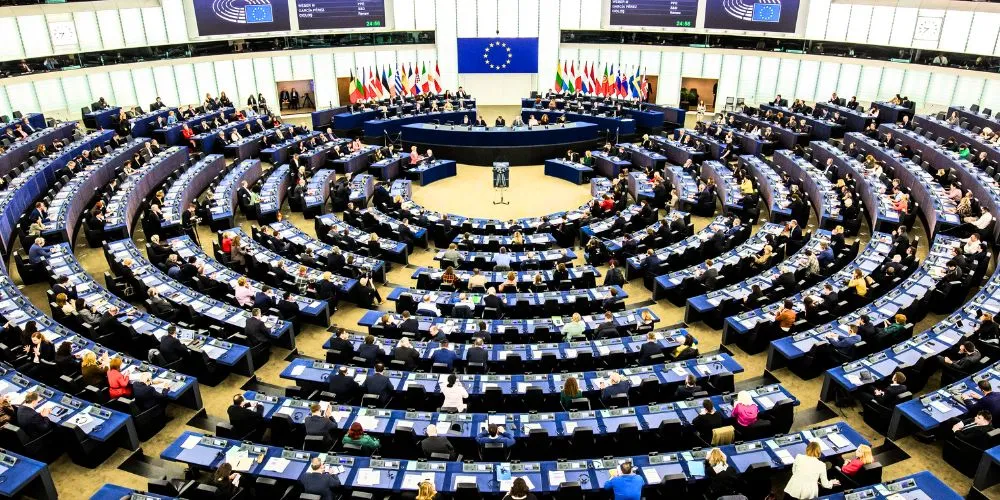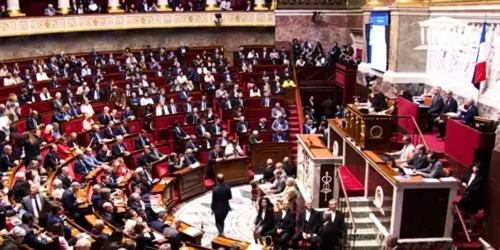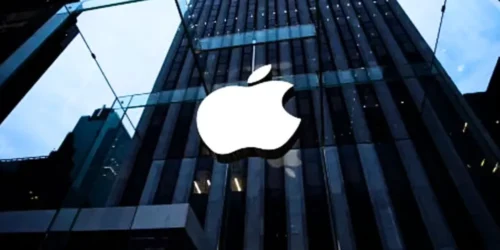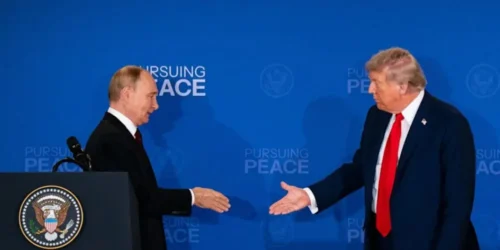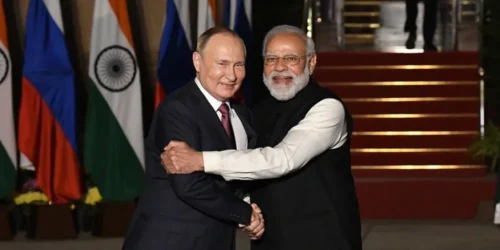The European Union projects an image of meticulous, almost tedious, order. It is a fortress of rules, a labyrinth of directives, a realm governed by multilingual technocrats who debate the precise curvature of a banana. Its spiritual home, the Berlaymont building in Brussels, is a monument to bureaucratic power—a vast, cross-shaped structure of steel and glass where the continent’s future is supposedly forged through reasoned compromise and painstaking regulation. For decades, the greatest accusation leveled against the EU was that it was boring, that its processes were too opaque and its leaders too distant.
Then, on a cold Friday in December 2022, Belgian police kicked down the door of that carefully constructed image. They didn’t find flawed directives or miscalculated budgets. They found bags. Bags stuffed with cash. Suitcases overflowing with hundred-euro notes. They found them in apartments, in hotel rooms, and the home of a glamorous, high-profile Vice President of the European Parliament.
The scandal, quickly dubbed “Qatargate,” was a shocking, visceral bolt from the blue. It was a story of foreign espionage, of suitcases full of money, of a shadowy network of influence operating in the very heart of European democracy. It felt like a plot from a cheap spy novel, utterly at odds with the EU’s self-image as a post-modern, post-corruption political entity.
But to dismiss Qatargate as a simple, grubby tale of a few bad apples succumbing to greed is to misunderstand the nature of the threat profoundly. This is not a case study about old-fashioned bribery. It is a case study of a far more sophisticated, insidious, and uniquely “European” form of corruption. It is an exploration of the specific vulnerabilities of a supranational, multi-layered political system, and how those vulnerabilities can be exploited not just by greedy individuals but by hostile state actors.
We will dissect the Qatargate scandal not as an isolated event, but as a symptom of a deeper malaise. We will explore the anatomy of the “Brussels Bubble,” the powerful lobbying machine that surrounds it, and the “revolving door” that spins between public service and private profit. This is the story of the ghost in the Berlaymont. This unseen, corrosive influence threatens to hollow out the European project from within, replacing the slow, difficult work of democratic deliberation with the quiet, transactional logic of the highest bidder. It is a battle for the very soul of the European ideal.
The Fortress of Rules – The Myth of a Post-Corruption Union
To understand why a scandal like Qatargate was so seismic, one must first understand the EU’s foundational myth: the idea that its very structure makes it uniquely resistant to the grubby, transactional politics that plague its member states.
The European project was born from the ashes of two world wars, fueled by a deep desire to transcend the toxic nationalisms that had torn the continent apart. The vision of its founding fathers—men like Robert Schuman and Jean Monnet—was to create a new kind of political entity, a supranational one. They believed that by weaving the economies and political destinies of Europe’s nations together, they could make war “not merely unthinkable, but materially impossible.”
This led to the creation of a unique and complex institutional architecture. Unlike a national government, power in the EU is deliberately diffuse, split between several key institutions:
- The European Commission: The executive arm, the “guardian of the treaties.” It proposes new laws and is staffed by a permanent, professional civil service of technocrats. Its loyalty is supposed to be to the Union as a whole, not to any single member state.
- The Council of the European Union: Composed of ministers from the national governments of the 27 member states. It represents the interests of the individual countries.
- The European Parliament: The only directly elected EU institution. The citizens of their respective countries elect their members (MEPs) and represent them in the legislative process.
This system was designed, in theory, to be a fortress against corruption. A corrupt actor couldn’t just bribe a single prime minister to get what they wanted. To influence an EU law, they would have to navigate a complex, multi-stage process involving the Commission, the Council, and the Parliament. The sheer complexity and the multitude of veto points were seen as a built-in defense mechanism.
Furthermore, the EU’s primary currency is regulation, not direct spending on massive infrastructure projects or defense contracts, which are the traditional feeding grounds for grand corruption in national capitals. The EU’s power lies in setting the rules for the vast European Single Market—the standards for everything from data privacy and chemical safety to car emissions and financial services. This is the famous “Brussels Effect”: when a company wants to sell a product in Europe, it must adhere to Europe’s high standards, which often forces it to adopt those standards for its products globally.
This focus on technocratic, rules-based governance created a powerful narrative. The EU was above the fray. It was a place where decisions were made based on evidence, expert consultation, and the greater European good. The “Brussels Bubble,” as it came to be known, was seen as a clean, if somewhat sterile, environment, far removed from the messy, favor-trading politics of Rome, Athens, or Budapest. Qatargate did not just challenge this narrative; it detonated it.
The Unraveling – Anatomy of the Qatargate Conspiracy
The story of Qatargate begins not in the halls of power, but with a single, disgraced figure looking for a new game to play. Pier Antonio Panzeri was a long-serving Italian MEP from a socialist party. He was a creature of the Brussels system, well-connected and knowledgeable about the inner workings of the Parliament. After losing his seat in the 2019 elections, he was suddenly on the outside, stripped of his power and prestige.
But Panzeri still had his most valuable asset: his network. He founded a human rights NGO in Brussels called “Fight Impunity.” On the surface, it was a noble endeavor. In reality, according to Belgian prosecutors, it was the central vehicle for a sophisticated influence-peddling operation. It was a front.
The scheme, as alleged by investigators, was audacious and cynical. Panzeri’s NGO would allegedly receive large sums of money from foreign states—primarily Qatar and Morocco—to polish their international image and influence decision-making within the European Parliament. The operation was not about passing a single, massive piece of legislation. It was about a death by a thousand cuts, a slow, patient effort to shift the narrative and tilt the political playing field.
The targets of the operation were carefully chosen. They were not the most powerful figures in the Commission or the Council. They were MEPs, particularly those sitting on key committees related to human rights, foreign affairs, and labor issues.
The star recruit, and the public face of the scandal, was Eva Kaili, a glamorous former news anchor from Greece and one of the 14 Vice Presidents of the European Parliament. She was a rising star, articulate and well-regarded. Her partner, Francesco Giorgi, worked as a parliamentary assistant and was a former aide to Panzeri, acting as a crucial link in the network.
The alleged modus operandi was a masterclass in exploiting the Parliament’s soft underbelly:
- Neutralizing Criticism: The primary goal was to block or water down any parliamentary resolutions or reports that were critical of Qatar’s human rights record, particularly its treatment of migrant workers in the run-up to the 2022 FIFA World Cup.
- Positive PR: The network would actively promote pro-Qatar narratives. In the weeks before the scandal broke, Eva Kaili gave a glowing speech in the Parliament, calling Qatar a “frontrunner in labor rights” and praising its reforms. This statement was met with disbelief by human rights organizations.
- Securing Privileges: The network allegedly worked to secure key policy wins for their paymasters, such as visa-free travel to the EU for Qatari citizens.
- The Tools of Influence: The influence was exerted through various channels. MEPs in the network would use their positions on committees to amend reports, deliver favorable speeches, and vote according to the wishes of their foreign sponsors. They would use their access to lobby other unsuspecting MEPs.
For years, the operation ran smoothly, hidden in plain sight behind the respectable facade of Panzeri’s NGO. But the Belgian intelligence services, working with other European agencies, were watching. They had been monitoring the network for months, tapping phones and conducting surveillance.
In early December 2022, they struck. Coordinated raids were launched across Brussels. The discoveries were cinematic. At the home of Panzeri, they found over 600,000 euros in cash. In a Brussels hotel room, they caught Kaili’s father with a suitcase stuffed with money. And at the home Kaili shared with her partner, they found more bags of cash. The total amount seized in the initial raids was around 1.5 million euros.
The arrests sent a shockwave through Brussels. Kaili was stripped of her vice presidency and expelled from her political group. Panzeri, facing a long prison sentence, quickly agreed to a plea deal, becoming a cooperating witness and promising to reveal the full extent of the scheme, including the names of everyone involved and the foreign countries that paid them. The unraveling had just begun. The ghost in the Berlaymont had a name, a face, and a suitcase full of cash.
The Systemic Sickness – Why the Fortress Had No Guards
Qatargate was not just a story of individual greed. It was a story of systemic failure. The conspiracy was able to operate for years because it exploited a series of deep, structural vulnerabilities in the EU’s institutional design. These vulnerabilities are the pathways through which the disease of corruption can infect the body politic.
The Parliament: The Porous Heart of the System
The European Parliament has, over the decades, grown from a consultative “talking shop” into a genuinely powerful legislative body. It now has co-decision power with the Council over the vast majority of EU law. But its internal rules and ethics enforcement have not kept pace with its growing power. This makes its members (MEPs) prime targets for influence operations.
- A Culture of Autonomy: MEPs operate with a great deal of independence. They are masters of their schedules and are subject to very little direct oversight.
- Weak Ethics Rules: Before the scandal, the rules on declaring assets, accepting gifts, and meeting with lobbyists were flimsy and poorly enforced. There was no single, powerful, independent ethics body with the authority to investigate and sanction misconduct. The system relied on self-policing, which, as Qatargate proved, was utterly inadequate.
- The Shadowy World of “Friendship Groups”: The Parliament is home to dozens of unofficial, cross-party “friendship groups” dedicated to building relations with non-EU countries. These groups operate in a regulatory grey zone, with little transparency about their funding or membership. They are the perfect vehicle for foreign states to cultivate friendly MEPs, offering all-expenses-paid trips and other perks in exchange for access and influence. Panzeri and his network were masters of using these informal structures.
The Revolving Door: The Permeable Membrane Between Public and Private
One of the most powerful and insidious forms of influence in Brussels is the “revolving door.” This is the practice of high-level EU officials—Commissioners, MEPs, senior civil servants—leaving their public posts and immediately taking lucrative jobs in the private sector as lobbyists, consultants, or corporate board members.
This creates a host of problems:
- Conflict of Interest: A Commissioner in charge of regulating the financial industry might make decisions that are favorable to big banks, knowing that a multi-million-dollar job at one of those banks is waiting for them upon retirement.
- Insider Access: When a former official becomes a lobbyist, they are not just selling their expertise; they are selling their network. They can pick up the phone and get a meeting with their former colleagues, giving their new corporate clients a level of access that is unavailable to ordinary citizens or NGOs.
- The “Pre-Emptive Bribe”: The promise of a future job can be a more powerful and subtle form of corruption than a bag of cash. It creates a culture where officials may subconsciously temper their regulatory zeal to avoid alienating potential future employers.
The examples are numerous and jarring. Former European Commission President José Manuel Barroso famously took a high-paying job at Goldman Sachs shortly after leaving office. Former Commissioners have gone on to work for Uber, Airbnb, and major pharmaceutical companies whose sectors they once regulated. While there are some “cooling-off” periods in place, critics argue they are far too short and full of loopholes. The revolving door ensures that the line between public servant and private lobbyist is dangerously blurred.
The Lobbying Leviathan: A Culture of Paid-for Access
Brussels is second only to Washington, D.C., as a global center for lobbying. An army of over 25,000 lobbyists operates in the city, representing every conceivable interest, from giant tech firms and financial institutions to environmental NGOs and trade unions.
While lobbying is a legitimate part of the democratic process, the sheer scale and opacity of the Brussels lobbying scene create an uneven playing field.
- Resource Imbalance: Corporate interests can afford to hire armies of professional lobbyists, law firms, and PR agencies. They can fund lavish events and sponsor think tank reports. Public interest groups and trade unions operate on a fraction of these budgets, struggling to make their voices heard above the corporate din.
- The Transparency Register: The EU has a joint Transparency Register where lobbyists are supposed to declare who they are, who they work for, and how much they spend. However, for years, registration was voluntary for many interactions, and the data provided is often vague and difficult to verify.
- The Black Box of the “Trilogue”: Many of the final, crucial details of EU legislation are hammered out in informal, closed-door negotiations between the Commission, the Council, and the Parliament, a process known as the “trilogue.” These meetings are highly secretive, with no public minutes. They are a prime target for intense, last-minute lobbying efforts, far from the public eye.
This creates a “pay-to-play” culture, where access to decision-makers becomes a commodity. It may not be illegal, but it corrodes the democratic principle that all voices should have an equal opportunity to be heard.
The Immune Response – Can the Fortress Be Repaired?
A scandal on the scale of Qatargate is a political heart attack. It is a moment of acute crisis, but it is also a rare opportunity for genuine reform. A healthy body politic, like a healthy biological organism, has an immune system. The scandal triggered a flurry of activity as the EU’s institutional immune system kicked in, trying to identify the pathogen and develop the antibodies to fight it.
The response was led by the President of the European Parliament, Roberta Metsola. Visibly shaken, she promised a wide-ranging package of reforms to “strengthen integrity, independence, and accountability.” The proposed reforms included:
- A “Cooling-Off” Period for MEPs: A ban on former MEPs lobbying the Parliament for a certain period after they leave office, an attempt to slow the revolving door.
- Greater Transparency: Making the lobbyist Transparency Register mandatory for anyone seeking to influence the Parliament, and publishing more information about MEPs’ meetings with lobbyists.
- Restrictions on “Friendship Groups”: Subjecting the unofficial friendship groups to stricter rules and transparency requirements.
- Asset Declarations: Requiring MEPs to declare their assets at the beginning and end of their mandate, making it harder to hide illicit enrichment.
The most significant and contentious proposal, however, was the long-awaited creation of a new, independent EU Ethics Body. For years, transparency advocates had been calling for such a body, a single watchdog with the power to investigate and sanction ethical breaches across all EU institutions.
The Antibodies: Potent Medicine or Placebo?
The crucial question is whether these reforms are strong enough to cure the disease. Critics were quick to point out the weaknesses.
- A “Toothless” Ethics Body: The Commission’s final proposal for the Ethics Body was met with dismay by transparency groups. Instead of a powerful investigative body with the authority to initiate its own probes and impose sanctions (like a trustworthy anti-corruption agency), the proposal outlined a much weaker body focused on developing common ethical standards. It would have no investigative powers of its own. Critics dismissed it as a “toothless tiger,” a bureaucratic fig leaf designed to create the appearance of action without actually threatening the status quo.
- Enforcement is Everything: New rules are only as good as their enforcement. Many of the proposed reforms still rely on self-reporting and internal oversight mechanisms that have failed in the past. Without a genuinely independent and empowered body to police the system, the risk remains that the new rules will simply be ignored by those determined to break them.
The battle over the strength and independence of the Ethics Body is the central front in the fight for the EU’s soul in the post-Qatargate era. It is a battle between those who want to fundamentally repair the fortress and those who are content to patch the most visible cracks.
Conclusion: The Enduring Ghost
The Qatargate scandal was a brutal but necessary wake-up call. It ripped away the veil of technocratic purity and exposed the raw human dynamics of power, money, and influence that operate even in the heart of the European project. It proved that the EU is not immune to corruption; it is merely susceptible to a different strain of the virus.
The corruption that haunts the Berlaymont is not the crude kleptocracy of a failed state. It is a more sophisticated, more insidious variant. It is the corruption of the velvet glove, the quiet transaction in the lobby of a five-star hotel, the lucrative job offer after a career in public service. It is a system that blurs the lines between legitimate lobbying and illicit influence, between public interest and private gain.
This form of corruption is, in many ways, more dangerous than outright theft. It does not just steal money from the public purse; it steals the public’s trust in the democratic process itself. It feeds the populist narrative that the “Brussels elite” is a self-serving, unaccountable cabal, a narrative eagerly promoted by autocratic adversaries like Russia, who seek to weaken and divide the Union.
The fight against this ghost is the defining challenge for this generation of European leaders. It requires more than just new rules; it requires a profound cultural shift. It requires a rejection of the “pay-to-play” culture and a fierce defense of the principle that access to power should not be a commodity for sale. It demands the creation of a truly independent ethics watchdog, with the teeth and the authority to hold the powerful to account.
The European Union was born as a magnificent, audacious dream—a dream of a continent at peace, bound together by shared values and the rule of law. That dream is now being tested, not by tanks at its borders, but by the quiet, corrosive influence of money in its corridors. The battle to exorcise the ghost in the Berlaymont is not just about cleaning up Brussels. It is about proving to a skeptical world and its citizens that the European dream is still worth believing in.

